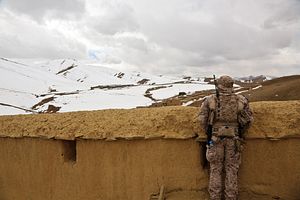It has been reported that U.S. President Donald J. Trump is considering withdrawing a significant number of troops from Afghanistan. Reportedly, Trump has directed the Pentagon to withdraw almost half of the more than 14,000 U.S. troops stationed in the country. While Trump’s sudden desire to withdraw has taken many by surprise, Afghanistan’s neighboring states are flocking to talk to the Afghan Taliban as the insurgent group appears to have gained more weight over the question of who controls the peace process in the country.
It remains unclear whether Trump’s withdrawing troops from Afghanistan is part of Washington’s wider policy for the country. What remains clear is this: the suggestion to withdraw troops has created a new situation that is apparently guiding policies in various capitals in Afghanistan’s neighborhood. Regardless of whether American troops leave in a month or in a year, Afghanistan’s neighbors are making plans to prepare for what comes next after the withdrawal.
It has become clear that the Taliban in Afghanistan are in no hurry when it comes to the peace process. The Taliban have long refused to directly talk to the Afghan government as they consider it illegitimate and a puppet of the United States. Moreover, the policy of the Afghan Taliban concerning disregarding the government in Kabul is actually a plan to delegitimize the powers that control Kabul at the moment. This position has further been toughened by the group’s bloody terror campaign, which continues unabated. While peace talks with the Taliban are underway, the group has accelerated attacks across Afghanistan. In the last week alone, a series of Taliban attacks in western and northern Afghanistan have killed more than 21 security officials. The group’s policy of continuing attacks is an indication that unless the peace process is conducted on their terms, the group has minimal interest in a serious process.
One of the core interests of the group is to gain legitimacy by engaging all international players that are invested in the country’s future. While the group doesn’t engage with the government in Kabul, they are happy to talk to anyone that wants to talk to the group. This shows two things on the part of the Taliban. First, when it holds talks with countries such as China, Russia, Iran, Pakistan, Saudi Arabia, and the United States, it automatically delegitimizes the government in Kabul and fosters the Taliban’s position as the only actor with the agency to restore stability in Afghanistan.
Second, by holding talks with any state at will or refusing to talk to some states, the Taliban shows that it is not a rogue actor. Rather, by engaging with various government dignitaries at the state level, the group’s leadership tries to elevate its position to the matching official level. The Taliban’s refusal to talk to the Afghan government is partially motivated by the group’s policy of considering itself a bigger player in Afghanistan than the government. It would be unwise to argue that the Taliban consider the Afghan government completely illegitimate.
The Afghan Taliban are aware that any efforts to restore peace in Afghanistan are not likely to succeed unless they support the process. Moreover, what is trickier in this entire situation is the question of why the Taliban would want to completely give-up their militancy campaign when it’s the only thing that keeps the group organized. It’s unclear too what the group may want to achieve by becoming part of an official power structure, which would surely demand that the Taliban lay down their weapons. Perhaps, the policy on the part of the Taliban is either to pacify the government in Kabul to an extent that the end to the war may solely be on the group’s terms, which may also include the group keeping its military apparatus intact.
In any case, the group remains concerned with strengthening its legitimacy as a credible player in Afghanistan while weakening the government and its allies’ position further in the country. While the United States may be looking for a face-saving to exit from Afghanistan, the Afghan Taliban’s leadership and its followers are here to stay.

































